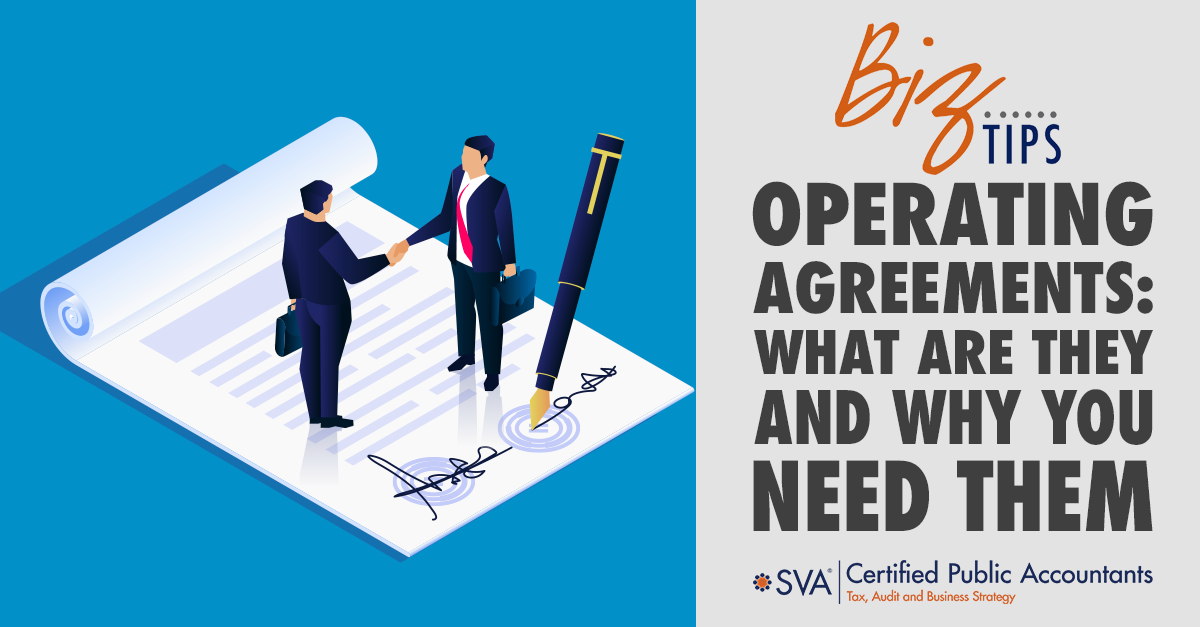Operating Agreements: What Are They and Why You Need Them
 What Are They and Why You Need Them" />
What Are They and Why You Need Them" />
Operating agreements are used to define a business’s financial and functional decisions and are documents used by companies to outline rules, regulations, and provisions for partners/shareholders. The documents are signed by partners/shareholders and govern the internal operations of the business.
Why Do You Need Operating Agreements?
- Operating agreements are used to define agreements in writing rather than verbally, which is needed if there is any future conflict. They protect the company and ownership from future situations by outlining any potential scenarios that may occur in the business.
- Operating agreements protect your business from state default rules. Any company that doesn’t have operating agreements in place will default to vague state rules when decisions need to be made, which is not advisable. You should be in control of your own business and have the proper legal documents required if any issues arise that need to be clarified.
- Operating agreements define the decisions that need to be made about the business including what happens if a partner/shareholder gets divorced, retires, or passes away. Inclusions may also cover what happens if a partner/shareholder steals or negatively impacts the company.
- Essentially the role of operating agreements is to protect both the partners/shareholders and the business.
What Do Operating Agreements Include?
Five main topics are typically included in operating agreements:
- Percentage of Ownership
- Voting Rights and Responsibilities
- Powers and Duties of Partners/Shareholders
- Distribution of Profits and Losses (Partnership)
- Buy/Sell Agreements
How Do the Buyout and Buy/Sell Provisions Work?
The buy/sell provisions in operating agreements are drafted to outline the specifics of what will occur if one person wants to exercise their buy/sell options. It will also protect in the case of a divorce or death of a partner/shareholder.
The agreement will outline how other partners may buy out the partner and the terms of the buyout. There are many ways to assess business value. Operating agreements detail the predetermined valuation process, eliminating disagreements when/if the time comes to exercise the provisions.

RELATED CONTENT: BIZ TIP
How Do I Establish Operating Agreements?
It may seem like you could save money by drafting your operating agreements. However, that is not advisable.
Enlist your legal counsel and a CPA with valuation experience. The legal counsel will ensure the agreements fairly represent everyone involved, while the CPA will have invaluable first-hand experience of what needs to be included.
Working with many business owners, and seeing obstacles that other companies may have faced, is the value your CPA will bring to the table. They will offer perspectives gained through years of experience working with business owners like you. SVA has that experience and will help guide you through the process.

© 2022 SVA Certified Public Accountants
Share this post:
Biz Tip Topic Expert: Nancy Mehlberg, CVB, EA

Nancy is a Principal with SVA Certified Public Accountants and helps clients improve their company profitability and protects their interests by clearly understanding their future goals. She works closely and proactively with clients with an emphasis in business and income tax planning and financial reporting.
Get Weekly Biz Tips Delivered Straight to Your Inbox!
Categories
- Corporate and Business Tax
- Financial Reporting
- Business & Practice Growth
- Manufacturing and Distribution Industry
- Nonprofit Industry
- Audit and Assurance Services
- Tax Credits & Deductions
- Real Estate Industry
- Business Transitions & Exit Planning
- Accounting Services
- Construction Industry
- Cash Flow
- Individual Tax Services
- Dental Industry
- Veterinary Industry
- Restaurant Industry
- Estate, Trust, & Gift Strategies
- Financial Statements
- Business Valuations
- Architecture & Engineering Industries
- Risk Management and Compliance
- Hotel Industry
- Accounting Software
- Depreciation
- Client Accounting Services
- Energy Credits
- Internal Controls
- Financial Ratios
- Fraud and Forensic Services
- Merger & Acquisition
- Business & Practice Startup
- Physician/Healthcare Industry
- Supply Chain
- Building a Board of Directors
- Shareholder
- Litigation Support


 What Are They and Why You Need Them" />
What Are They and Why You Need Them" />


